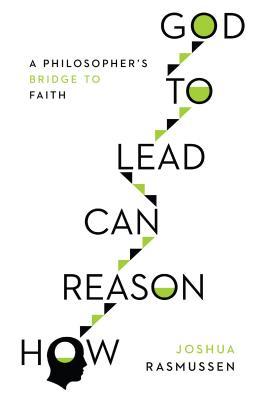How Reason Can Lead to God, Joshua Rasmussen. Downers Grove: IVP Academic, 2019.
Summary: Argues for a “bridge of reason” that leads us to God, based on the foundation of reality.
I’ve never believed that one can prove the existence of God. At the same time, I believe it can be shown that faith in God is reasonable, rather than contrary to reason. I also would acknowledge that some propose that it is reasonable that there is no God. All I’ve ever been able to commend is that the sincere seeker of truth weigh these reasons, and act upon whatever is persuasive to them.
This is a book that lays out a reasonable argument in the form of a “bridge of reason.” The image is important because the author would argue that reason rests upon a foundation and the nature of the foundation both makes sense of our reason and is persuasive of the existence of a God at the foundation or source of all.
First of all, he argues for the self-sufficiency of reality and that this foundation meets nine possible objections. This self-sufficient reality is eternal, that is it never came into existence but is the source of all that exists. The tools of simplicity, explanatory depth, and uniformity point to a “purely actual” foundation that is a unity without gaps or limits. Furthermore, this foundation explains the existence of mind, matter, morals, and math (that is, logic or reason). Indeed, this foundation may be argued to be the perfection of these from which all derives, and hence a perfect foundation.
Rasmussen then considers problems with this foundational theory. The greatest, as in almost every argument for the existence of God is the existence of evil. Here, he argues for the possibility of God having good reasons for the existence of evil, particularly as a result of the creation of “kingly creatures” able to govern their own lives with the possibility of ruling badly. He devotes a chapter to this objection, and then an additional chapter to eight other objections.
He finally pulls all of this together through an argument from limits that points to the existence of perfection. He states:
Here is an idea: perfection–by the light of its simplicity and positivity–points to its own possibility (i.e. consistency). Something cool follows: by the logic of possibility, perfection must be instantiated. In this way, perfection points by its own nature, to its instantiation.
He works out this argument step by step in more or less non-technical but closely reasoned language. A person with training in logic will especially appreciate Rasmussen’s presentation, and perhaps also pick it apart! Certainly those who question the existence of reality, or our capacity to perceive reality beyond ourselves would have difficulty with his argument. However, I suspect they also have trouble with existence, because they act as if other minds, and other objects exist.
I am not a philosopher but it seems to me that he does something fairly novel. His is neither a cosmological or ontological argument for the existence of God. It is something like a Cartesian argument from reason, yet focuses on the foundation of existence that our capacity for reason is based upon.
One question I had was around his argument for the self-existence of the “blob of reality” at the foundation of all. I’m not quite sure of how Rasmussen distinguishes God and created reality. It seemed at least possible that his argument could give warrant for panentheism, the idea that all is in God, an idea not considered within orthodoxy by many Christians.
Rasmussen does not contend for this and I think he does a service both for skeptics, and for apologists in proposing yet another line of reasoning rooted in reason itself and our common experience, for the reality of God. I’ll be interested to see how his ideas are received among philosophers, and how he continues to develop his “bridge of reason.”
________________________________
Disclosure of Material Connection: I received a complimentary review copy of this book from the publisher. The opinions I have expressed are my own.

Pingback: The Month in Reviews: October 2019 | Bob on Books
Thanks for this review, Bob. When I read your 3rd full paragraph beginning with ‘First of all,…’ I had a sense that there was some question-begging going on. Assuming the conclusion in the ‘first points’ about reality and its, ‘purely actual’, self-sufficiency, and perfection. Then in your next to the last paragraph the question of how such escapes leading to pantheism or panentheism is a very good question. Perhaps he was speaking of ultimate reality but from your description it does seem he is talking about the created reality. I see JR teaches at Azusa Pacific and graduated from ND with his Ph.D. in philosophy.
In the last sentence of your first paragraph I’d add something like ‘and after acting on whatever is persuasive to you, continue to reassess with the same sincere seeking.’ Kind of reminds me of Socrates’ quote on the ‘unexamined life’, and the flip side. Thanks again for this review. The book title is carefully nuanced in a curiosity inspiring way.
LikeLiked by 1 person
Joe, it is actually quite refreahing when someone reads one’s reviews closely! I thought it quite an unusual book and I also appreciated the nuancing of the title.
LikeLike